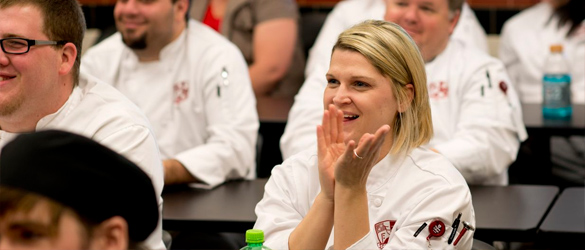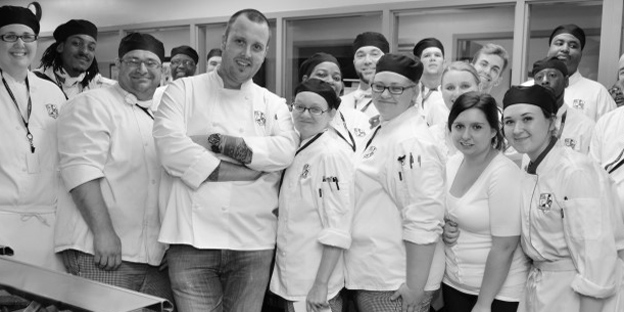Should you go to culinary school?
This has become a hot topic of conversation and it’s not going anywhere soon.
More than ever, people of all ages are chasing the dream of running their own restaurant or becoming the next “celebrity chef” to host the new hottest kitchen show on television. It’s the new American dream: reality television super star chef. Tons of obscure, self-made food personalities have risen from nowhere to claim their portion of an industry that shows boundless limits. When it comes down to getting dirty, how many of these culinary driven professionals have the skill to succeed, and are they willing to wait?
Some chefs argue that a few culinary schools, also known as “chef factories”, have misled or failed to educate students about the realities of restaurant life. For an industry that traditionally boasts an especially low starting salary for graduates, alongside a high price tag for education, it’s a shocking but an interesting conundrum. For many, however, they’re completely aware of “restaurant life” and choose to get involved because they love what they do.
But with all of the buzz about the industry, culinary school admissions are at an all-time high. The country’s best schools will set you back a decent chunk for either an associate’s or bachelor’s degree. And yet, when you break into the industry, the average hourly wage is just about ten dollars an hour. This is labor intensive work that happens around the clock, on weekends AND holidays. It’s the initiation process common among many professions. You are the low “man” on the totem pole, but you must start somewhere. Will it improve? Yes…but will you earn every sweaty cent of your ten dollars. Again, chasing a dream isn’t easy. I recently spoke with friends Simon Majumdar and Justin Fox Burks to discuss this dilemma that aspiring cooks face every day.
BV – Would you guys go to culinary school?
SM – I didn’t go to culinary school, because I am not and never had any intention of becoming a kitchen hardened chef. My food interests lie more in the connections between food, people and their cultures, so in that sense the road and my travels around the globe are my “school”.
JFB – Yes I would. I learned to cook like I learned how to play guitar, by watching people who are way better at it than I am. This method would have not been as effective if my job as a photographer didn’t take me into some of the South’s greatest kitchens. I ended up with impromptu, one-on-one culinary lessons from some really amazing chefs like Andrew Adams, John Currence, and Kelly English. However, even with all of the great help, I still feel like a piece is missing from my fundamentals in the kitchen.
So why can’t we have both? The old world mindset: attach yourself to a notable chef or restaurant and work. Go old school, with a little notebook in your back pocket absorbing every detail you learn. I’ve saved dozens of notebooks from multiple kitchens and every time I reflect on what I learned I find it more valuable to my career and an incredible way to reflect and remember. And with enough time invested, you will methodically move your way through the kitchen and learn by doing, while earning money. There isn’t a time table, so don’t set your clocks or mark your calendar for your “graduation” date. And when you get to the point where you stop “sucking,” then, and only then, make the expensive choice to invest in yourself with a culinary education. This will create a frame, a template that you can apply and recall what you’ve learned on the job. These two types of experience will start to make sense from a practical and realistic standpoint on the execution of day to day cooking.

Learn to truss a chicken before you launch your television career. This isn’t a dream crusher by any means – go for it! But aggressively goal set with measurable and attainable goals realistic to track. Dive into the culinary stage head first, mastering real kitchen skills, while your plan is being executed for the long journey.
Culinary schools can be a very important step not to miss when building a well-rounded kitchen culinarian. It’s also the fundamentals that are often over-looked when you’re deep in the thick of service delivering hundreds of piping hot entrees at the local bistro.
All this is strictly based on my personal opinion. The facts on this topic are simple in a quick broad stroke. Culinary schools are expensive, but for the right students, incredibly effective. For the others, save your money and your credit score. The life of a television chef isn’t realistic even though it’s loosely titled “reality TV”. It is realistic that most chefs will work long hours for low money. And it’s the love of the game that keeps those chefs coming back for more even when it hurts. If you consider the odds, they are against you, but anything you love is worth the blood, sweat, and tears it will require to launch a culinary career. Focus on what you intend on accomplishing. If you read Simon and Justin’s advice for themselves, you start to understand how different and unique this industry is. The culinary field is truly multidimensional. It’s an onion that never stops peeling. From chefs, writers, bloggers, photographers, food stylists, restaurateurs, brokers, celebrity chefs, line-cooks, wine sommeliers and food and beverage directors – each position in this industry is critical and requires the right balance of knowledge and experience to perform efficiently.




























CONNECT WITH THE WORLD FOOD CHAMPIONSHIPS